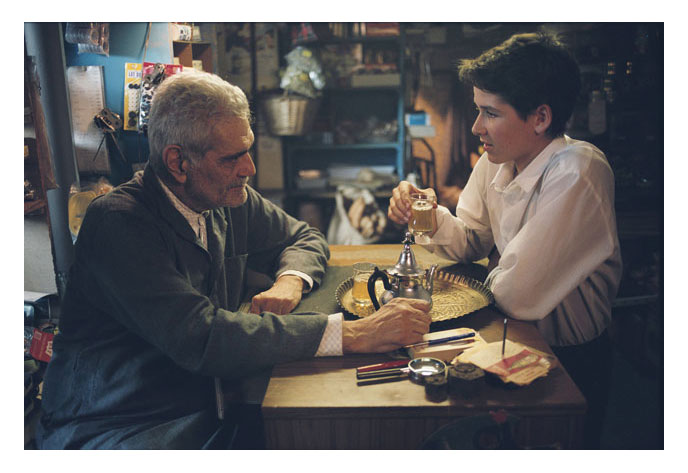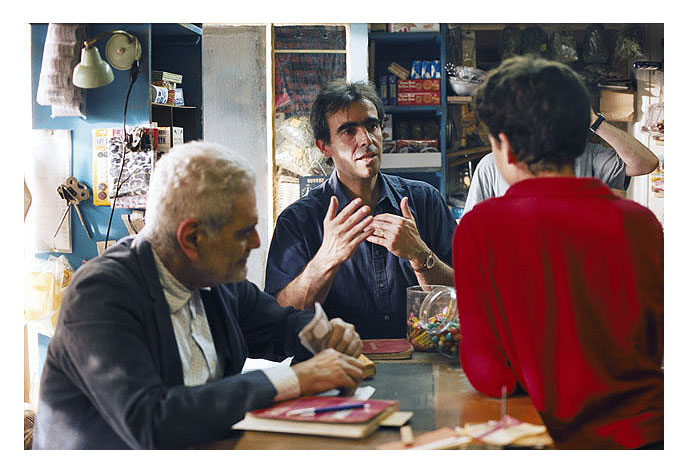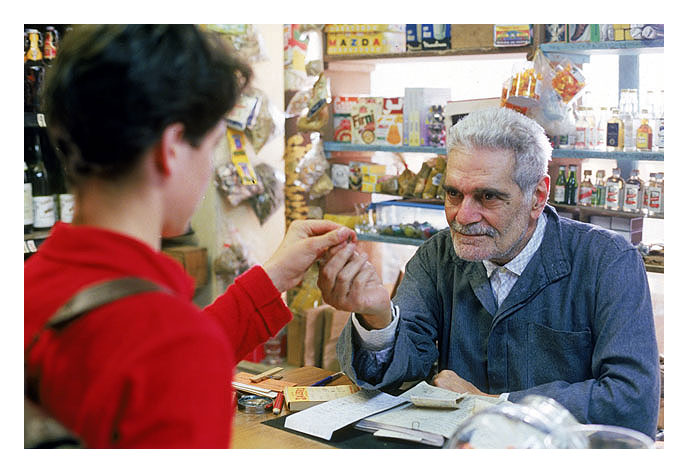 
|
 |
|
Q: Is it true that you did not want to make any more movies? OS: Totally true. After my small role in the The Thirteenth Warrior with Antonio Banderas, I said to myself "Let us stop this nonsense, these meal-tickets that we do because it pays well. Unless I find a stupendous film that I love. And that makes me want to leave home to do, I will stop." Bad pictures are very humiliating, I was really sick. It is terrifying to have to do the dialogue from bad scripts, to face a director who does not know what he is doing, in a film so bad that it is not even worth exploring. I didn't expect to find any picture or role that could make me want to start working again. It is not easy to find something that you want to play when you are old, with an indefinable accent and a rather oriental appearance. But last winter, while I was on vacation in Cairo, I had taken the M. Ibrahim script with me, and I had a chance to read it. I always read because, as you can see, you never know. I called immediately from Cairo. I never go to the movies so I knew nothing of Dupeyron. But, on the other hand, I did know Eric-Emmanuel Schmitt, because I go to the theater. Q: What was your first impression upon reading the script? OS: I was moved, touched and carried away by this script. I loved the theme, it interests me at this point in history. I wanted to get involved in this. I am not at all politically active. My son married a Jew, then a Catholic, and then a Muslim. That should tell you that I am open to all religions. But I have to say that for me this film is not religiously or even politically engaged. What I liked is that it was a love story, a film about humans, about exchanges. To me the fact that one of them is Jewish and the other Muslim is incidental, the relationship would be the same. This greengrocer that philosophizes without realizing it, is a man full of common sense, a kind of sage. The boy, Momo, to whom nobody has ever spoken, who never communicates with anyone, finds in Ibrahim a guy whose sayings make no sense to him in the beginning, but when he thinks about them, he realizes that he is not idiotic at all. He finds Ibrahim's deeds beautiful, so he concludes that what he says is also beautiful. He learns to trust him. Q: What was difficult about Ibrahim's role? OS: I had to find the way to say meaningful things without sounding pretentious. To find a lightness and to that end I tried to make Ibrahim seem eccentric. He really is like Momo, he has nothing in his life. He spends his time in his grocery and does not talk to anyone. He is not really engaged in his business; sitting on his stool he sells things….that is his routine. He does not have a business sense. His work keeps him busy and lets him watch the passersby. Momo provides him with a reason to live, a new taste of life. I can understand that, because as I have grown older, my sense of life has changed. There is nothing that really fires me up. Maybe some friends and some dinner conversations when we are speaking freely. That is my only pleasure, and the two nights a week when I dine at the races. I have cut myself off from many pleasures, like bridge, for instance. For starters I was getting too carried away and I was starting to be less good at it. I cannot stand mediocrity. To play high level bridge requires intense concentration, eight hours a day for two straight weeks. I started to make mistakes. No champion is older than fifty, anyway. So I stopped. I did not want to become a parlor player. Q: Are you very competitive? OS: Yes, my mother put that in my head. I really became an actor because of her. I was going to school at the French Friars. When I was about ten years old I started to fatten up: too much chocolate, too many pastries. My mother could not stand that. She wanted me to be exceptional… beautiful and famous. I could not be fat. She enrolled me in an English school, because the English don't eat well. And thanks to her I lost weight and learned English. I owe her my career. |
 |
|
Q: When did you meet Director François Dupeyron? OS: He came to dinner with his producer. I trust my instincts. That evening I liked him. He didn't say anything spectacular, he even exhibited a true naivete. There was something provicial about him, very engaging. François is an innocent, and I love people like him. I think that he was afraid of my sophistication. But we started rehearsals quickly and I liked my relationship with him. He was the director that I needed. I needed to be pushed, even a bit roughed up, to be told "Cut! That was nothing." Generally he was right. He is a guy who does not express himself very well, but I always had a sense of what he wanted. I understand people before they talk to me. Conversely, people who explain too much annoy me. François and I got along fine. Q: François was amazed to find you on the set early in the morning--three hours before your call. OS: I was passionate about the film. I wanted to be there all the time, to soak the film up, and to live it to the full. I am a passionate person. While I am doing something that I like, I will be the first on the set and the last to go. I don't interfere, truly, I do not, I just watch to get ideas. Otherwise, when you arrive at the last minute, in your actor's skin, everything is ready to roll and you can contribute nothing. Whereas if you participate in the set-up, you can tell the team "Let's try it," and that is how ideas are born. I never have any preconceptions about a role, because if the director sees things differently from what I have imagined, I seize up. An actor is like a cloth merchant. He brings his wares to the director, who is the customer. The director will say: "Show me what you have." The actor needs to be able to show him a variety of wares. The director looks and he chooses. Sometimes he mixes up all your proposals. He has to choose the cloth he wants. If you, as an actor, make the decision to show him some wool while he has been looking for silk then you are finished. Which is why I like to come in early, to get involved in his [the director's] choices, to show him that there are things that I could do, things that I would dare to do which he might dare to ask for. Then I will have time to think, to get myself into the frame of mind to play that particular scene. I want to be available to the director. |
 |
|
Q: How was it to work with Pierre Boulanger, the boy who plays Momo? OS: I spent a lot of time before the start of film with him and a coach, and it was wonderful for both of us. I did a lot of improvisations with him, and that laid the groundwork for our future relationship. We did not work on any of the film's scenes, but we improvised situations likely to be encountered by our characters, Ibrahim and Momo. Before and after our work, we sat together watching the French Open at Roland Garros. He is a quick learner, and gained aplomb in no time. After two days of filming he was almost telling me what I should be doing! He really is a great boy. I have a lot of affection for him. Q: How did you get into Mr. Ibrahim's skin? OS: I soak up a character slowly. Once I have accepted a role, the character enters my brain definitively, and never leaves my thoughts. Little by little the character grows, takes form, I see him walk, move, the way he holds his head, he comes to life. Sometimes I laugh to myself, I search, I find funny stuff for him. I was terrified of finding Ibrahim boring, because Momo is, from the beginning, a rather sad character, and if Ibrahim acts pedantically, or starts to give him lessons in morality, we would be in danger of making the most annoying film ever. Luckily I break up everything that I say in the film with some humor. It is a picture about smiles, I had understood that much a long time before I knew how to say it. When Momo opens up his first smile and begins to get what he wants, the pictures takes off. Q: The physicality of the role, the clothes—does that help you to get into the character? OS: Of course, and the djellaba, the beard, all that was perfect. I bent over slightly for the film, I drag my leg a little, I show a little gut… But frankly, what counts is not so much the disguise as the demeanor. Q: The sixties, the years shown in the picture…you spent them in the USA? OS: And how! That was my greatest decade! I was hated in Egypt because I worked with so many Jews. I must say that loving the movies and gambling I saw nothing but Jews, naturally. I signed a seven year contract with Columbia, and I was directed by the greats: Fred Zinneman, William Wyler, Sydney Lumet. Unfortunately, it was in their worst films! Q: You actually look a lot like Monsieur Ibrahim. You have the same kind of wisdom, a similar liking exchanges…. OS: I share his philosophy, absolutely, but with a great difference. I have a clear preference for luxury. What ever I make I immediately spend. I am incapable of saving anything. But I spend by sharing; I give…I take people to meals. I need to exchange ideas, feelings. I am not interested in ownership, and I own nothing. I am interested in people. When I arrive in a foreign country, I want to sit down and talk. Visits to museums? I could care less. This is also because of my mother. She was a spendthrift, whereas my father was very frugal. She used to say when she was sending me off to play poker: "Go gamble and lose. I want everybody to say that this boy is truly like his mother, and has nothing of his father!" |
 |
|
Q: Were the scenes in the grocery difficult? OS: Oh, the most difficult of the picture, because there was the danger of repetitiveness. I am sitting there, the boy comes in, and I say something. I wanted to introduce a certain lightness, find some humor. Because of the obvious constraints of the set, we shot those scenes consecutively and it was very difficult, I was always afraid of being tedious. And, in addition, you had to watch out for the details of time passing and the nuances of the growing relationship between Ibrahim and Momo and the affection that slowly develops between them. The scene with the movie star is crucial, as it creates a bond of complicity between them. Suddenly they are talking about girls, they talk about Momo's stealing…and it takes off from there. I believe that before meeting Momo, Ibrahim is very lonely. I know all about that, as I have lived on my own for a very long time. Q: Does Ibrahim know where his trip to Turkey is going to take him? OS: Monsieur Ibrahim is a man who feels very simply and instinctively without really analyzing his feelings, and he never does anything to change the course of things as he surmises them. Turkey was technically the most complicated part of the filming. You are really driving that car, the production team is really riding on your back. It is windy and it's really difficult to concentrate on speaking your lines into microphones. With a winding mountain road, the lights in my eyes, it was a miracle that I didn't wreck the car, especially since I rarely drive. But I love those scenes in Turkey. Ibrahim and Momo's trip was a bit like a honeymoon. |